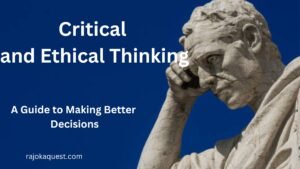Honesty as a Leadership Quality

Honesty 3D Word with Target and Dart - Color Background - 3D Rendering
Integrity is usually a pillar of excellent and respected leadership. “Honesty as a leadership quality” is fundamentally more than just a matter of truth-telling. It captures openness, honesty, and authenticity for team members and stakeholders, strengthening their trust and respect. Emphasizing its importance and usefulness, this paper investigates the several facets of honesty in leadership.
The Importance of Honesty as Leadership Quality
Developing credibility and trust
Developing reputation and trust requires honesty. Leaders who regularly show integrity help to establish a situation whereby team members feel safe and appreciated. Any organization’s success depends on open communication and teamwork, which rely on this trust. When team members think their boss is honest, they are more inclined to return this honesty, fostering a transparent and respectful culture.
Encouraging a Good Work Environment
An honest boss models a good work culture and inspires staff members to be honest and open by modeling such behavior. This transparency results in a more unified and driven workforce where people feel free to provide ideas and comments. Apart from raising employee satisfaction, a good work culture helps to boost output and creativity inside the company.
Promoting Ethical Behavior
Leaders who prioritize honesty inspire moral behavior among their subordinates. This ethical basis encourages employees’ feelings of responsibility and integrity and helps prevent wrongdoing. Thus, Ethical behavior allows the company to succeed and have a good reputation. Leaders who lead with honesty and integrity create a benchmark that motivates their subordinates to behave with the same degree of ethical dedication.
The Impact of Honesty on Decision-Making
Improved Methodologies of Decision-Making
In leadership, honesty improves decision-making procedures. Those who prioritize honesty are more likely to consider several points of view and make wise judgments. This strategy guarantees that every team member feels heard and appreciated and raises the caliber of decisions. Making informed decisions lowers the possibility of mistakes and increases the chance of getting the desired results.
Reducing Risks and Avoiding Mistakes
Open leadership helps one to spot possible hazards and steer clear of mistakes. Leaders who are open about difficulties and failures can resolve problems early on and stop them from getting more serious. Maintaining organizational stability and resilience calls for this proactive strategy. Good leaders are more suited to negotiate uncertainty and make strategic decisions that will eventually help the company.
Encouraging honest conversation
Making decisions with integrity promotes honest communication. Leaders’ encouragement of honesty creates a comfortable environment where team members may express their problems and ideas. This openness leads to more thorough debates, different points of view, and improved outcomes. Furthermore, encouraging team members’ involvement and sense of inclusion is open communication.
Practical Applications of Honesty in Leadership
Open Communication Channels
Maintaining open communication channels is among the most valuable uses of honesty in leadership. Leaders should inspire frequent open communication inside their teams. This candor guarantees that everyone is in agreement and helps to build confidence. Good communication also facilitates quick resolution of issues and addressing of worries.
Consistency in Words and Actions
Honest leaders match their words to their behavior. Team members who experience this consistency develop credibility and confidence. Leaders who live what they teach provide a robust model for their staff to emulate. Consistency in words and deeds supports the leader’s dedication to integrity and honesty, enhancing team loyalty and respect.
Giving Constructive Feedback
In leadership, honesty also includes offering helpful criticism. Leaders should be honest in their evaluations and provide comments to enable team members to develop and flourish. Giving constructive comments with empathy and respect would help areas concentrate on particular development areas and provide doable recommendations.
Owning Errors and Growing Out from Them
Reliable leaders are not reluctant to admit their faults. Admitting mistakes and owning them shows humility and moral character. It also provides a model for staff workers to own their errors and grow from them. Owning mistakes helps create a resilient and constantly improving culture.
Adopting Open Policies
Leaders who follow open policies and practices show integrity. Explicit policies on conflict resolution, performance reviews, and decision-making help guarantee equitable treatment of every team member. Open policies also offer a structure for responsibility and confidence inside the company.
Difficulties of Honesty in Leadership
Navigating Tough Conversation
Although honesty is essential, it may often be difficult, particularly in trying circumstances for a conversation. Leaders have to negotiate these dialogues tactically and with empathy so they may be honest without souring relationships. Difficult talks like giving bad news or addressing poor performance require meticulous preparation and a measured approach to keep respect and trust.
Balancing Transparency with Confidentiality
Juggling confidence with openness presents another difficulty. Leaders must be truthful while honoring the privacy of some data. Maintaining integrity and trust depends on finding this equilibrium. To safeguard the company’s interests and privacy, leaders must identify what material may be shared freely and what should be kept secret.
Overcoming Personal Biases
Good leadership requires overcoming one’s own prejudices and inclinations. Leaders must be self-aware and aim to make objective decisions and contacts free from bias. Personal prejudices might impede honest communication and decision-making, resulting in unjust treatment and mistrust within the team. Leaders who practice constant self-reflection and feedback-seeking might help themselves recognize and lessen their prejudices.
Handling Obstacles
Team members acclimated to a more opaque approach could object to honest leaders. Overcoming this opposition calls for persistence and patience, as well as continually proving the advantages of honesty. Leaders should support and mentor team members in adjusting to a transparent and trustworthy culture.
Case Studies of Honest Leadership
Satya Nadella at Microsoft
Microsoft CEO Satya Nadella is often praised as a model of honest leadership. His open communication style and transparency have primarily contributed to the transformational change in Microsoft’s culture and its success. By stressing empathy and teamwork, Nadella has helped Microsoft create an innovative and inclusive culture that defines honest leadership.
Starbucks’s Howard Schultz
Former Starbucks CEO Howard Schultz likewise models integrity in leadership. Starbucks has become a worldwide acknowledged brand thanks mainly to its dedication to openness and moral behavior. Schultz’s leadership approach stresses the need for integrity and social responsibility, which has helped Starbucks to have excellent brand recognition and consumer loyalty.
Indra Nooyi at PepsiCo
Another example of honest leadership is Indra Nooyi, past CEO of PepsiCo. PepsiCo’s expansion and success have been ascribed to her open and inclusive leadership style. Both inside and outside of the company, Nooyi’s dedication to ethical behavior has won her much respect and appreciation.
Apple’s Tim Cook
Apple CEO Tim Cook is well-known for his open approach to leadership. Since replacing Steve Jobs, Cook has underlined the need for moral behavior, privacy, and environmental responsibility. His open attitude has enhanced Apple’s brand and developed confidence among consumers and stakeholders.
Mary Barra at General Motors
General Motors CEO Mary Barra has shown open and honest leadership. Through her direct communication and dedication to fixing the company’s recalls and safety concerns, Barra gained respect and credibility. Rebuilding confidence with stakeholders and consumers has depended critically on her honest approach.
Long-Term Advantages of Honestl Leadership
Success and Sustainable Growth
Success and sustainable development are products of honest leadership. Since they create a strong basis of trust and integrity, companies run under honest executives are more likely to succeed in the long run. Strong stakeholder relationships, an excellent organizational reputation, and a committed workforce drive sustainable development.
Improved Staff Loyalty and Retention
Workers are more likely to stick to companies that prioritize integrity. This loyalty improves general organizational stability and helps lower turnover rates. Good leadership builds trust and a feeling of belonging, motivating staff members to remain with their company and helping it grow.
Strengthened Relationships among stakeholders
Open leadership improves ties with investors, partners, consumers, and stakeholders. Maintaining excellent and effective stakeholder relationships depends on confidence and credibility, which transparency and honesty help to create. Strong stakeholder ties help the company be known and thrive in long-term enhanced Organizational Resilience
Good leadership strengthens organizational resilience. Those who prioritize honesty will be better suited to negotiate obstacles and uncertainty. They can make wise decisions, handle problems ahead of time, and adapt to changing conditions. Organizational resilience is the only way to thrive and survive in a fast-paced corporate world.
Boosted Creativity and Innovation
Good leadership creates conditions for creativity and innovation to bloom. Team members who feel safe and respected tend to be risk-taking innovators. Honest leaders who foster and recognize originality in their culture encourage transparency. This innovative culture can propel significant progress and competitive benefits for the company.
Improved Public Image and Brand Reputation
A strong brand reputation and an excellent public image are expected benefits of companies run by sincere CEOs. Ethical behavior and openness appeal to consumers and the general public, fostering more confidence and allegiance. Good brand recognition can draw in fresh business, keep current, and provide development and expansion chances.
Conclusion
In essence, developing trust, promoting a good work environment, and improving decision-making procedures depend on honesty as a leadership trait. Notwithstanding the problems, the advantages of good leadership far exceed the drawbacks. Leaders who prioritize honesty will build a solid and profitable company. Apart from driving corporate success, honest leadership helps leaders and their teams develop personally and find fulfillment.







I found one spelling mistake “Difficulties of Honesty in Leadership” here honesty is write as honestyg. just for correction not to criticize I really appreciate your hard working.
I am very thankful for your keen interest. Its my pleasure to identified by you.
Greetings,
Am glad to connect with you, My name is Pitroda Satyan G, am an investment consultant with Shrooq AlQamar Project Management Services Co LLC, I have been mandated by the company to source for investment opportunities and companies seeking for funding, business loans, for its project(s). Do you have any investment or project that is seeking for capital to fund it?
Our Investments financing focus is on:
Seed Capital, Early-Stage, Start-Up Ventures, , Brokerage, Private Finance, Renewable Energy Project, Commercial Real Estate, Blockchain, Technology, Telecommunication, Infrastructure, Agriculture, Animal Breeding, Hospitality, Healthcare, Oil/Gas/Refinery. Application reserved for business executives and companies with proven business records in search of funding for expansion or forcapital investments..
Kindly contact me for further details.
await your return e.mail soonest.
Regards
Dr. Pitroda Satyan G
Shrooq AlQamar Regional Consultant
Address: 72469 Jahra Road Shuwaikh Industrial
Tel/WhatzApp: +968 7866 9578
Email: agent@shrooqconsultant.com
Our Offices:
Middle East Facilitating Office: Ahmad Al Jaber St, Kuwait City, Kuwait
Oman Branch Offices: CHXM+J3G, Sohar, Oman
UAE Dubai: Financial Consortium
I am very thankful to you for your keen interest .How can you help me?